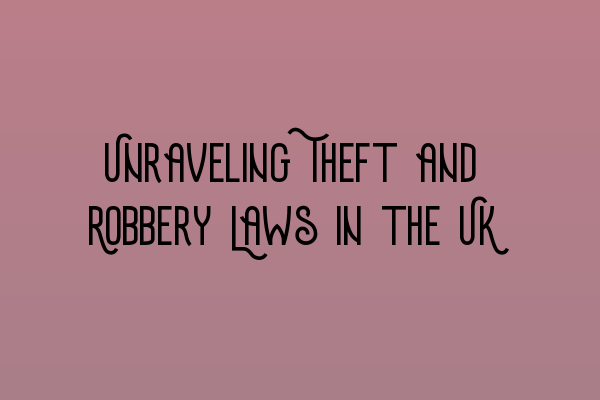Unraveling Theft and Robbery Laws in the UK
Welcome to SQE Criminal Law & Practice Law UK! In this blog post, we will delve into the complexities of theft and robbery laws in the UK. Understanding these laws is crucial for both legal practitioners and individuals seeking to be well-informed about their rights and obligations.
Let’s start by clarifying the distinction between theft and robbery. Although both involve the unauthorized taking of someone else’s property, they differ in terms of the presence or absence of force and the circumstances under which the offenses are committed.
Theft Laws in the UK
Theft, as defined under Section 1 of the Theft Act 1968, occurs when a person dishonestly appropriates property belonging to another with the intention to permanently deprive the other of it. It is important to note that dishonesty is a crucial element of theft. To prove theft, the prosecution must establish that the defendant acted dishonestly.
The act of theft does not require the use of force. It can range from simple acts of shoplifting to more complex forms of fraud. The severity of the offense is often determined by the value of the stolen property and the surrounding circumstances.
For more information on theft laws and the elements required for a conviction, you can review our related article on SQE 1 Practice Exam Questions.
Robbery Laws in the UK
Unlike theft, robbery involves the use of force or threat of force to steal someone’s property. This offense is taken much more seriously by the legal system and carries severe penalties. The offense is outlined under Section 8 of the Theft Act 1968.
To establish a charge of robbery, the prosecution must prove that the defendant: (1) stole property; (2) used force, or threat of force, at the time of stealing; and (3) intended to permanently deprive the owner of the property. These elements ensure that the offense is more than just a simple act of theft.
If you are interested in exploring more about robbery laws and the penalties associated with this offense, we recommend reading our insightful article on SQE 1 Practice Mocks FLK1 FLK2.
Conclusion
Theft and robbery laws in the UK are complex, and a thorough understanding of these laws is essential for legal professionals and individuals alike. By recognizing the distinctions between theft and robbery, we can better navigate the nuances of these offenses and the potential consequences.
To learn more about criminal law in the UK and prepare for the SQE exams, we offer comprehensive courses such as SQE 2 Preparation Courses and SQE 1 Preparation Courses. These courses provide invaluable guidance and exam preparation resources for aspiring legal professionals.
For more information on SQE exam dates and registration, including dates for the SRA SQE exams, please visit our article on SRA SQE Exam Dates.
We hope this blog post has shed light on the intricacies of theft and robbery laws in the UK. If you have any questions or would like further information, please do not hesitate to contact us. Stay tuned to our blog for more insightful articles on criminal law topics!
